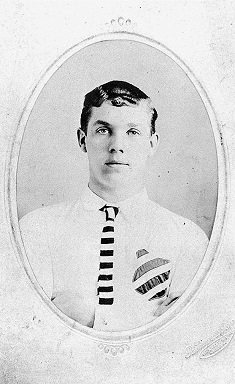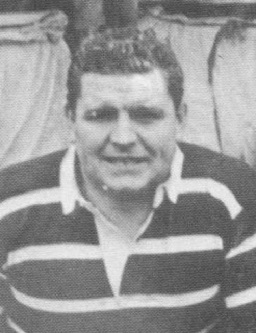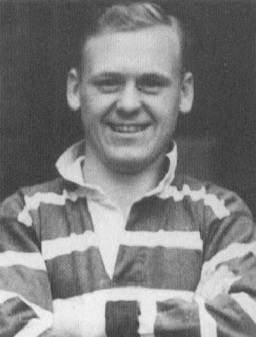Related Research Articles
Paul Newlove is an English former professional rugby league footballer who played in the 1980s, 1990s and 2000s. A Great Britain and England international representative, he competed in the Super League competition, featuring as a centre. He played for St Helens during a successful eight-year period with the club. Newlove was a Great Britain international. Newlove also represented England at the 1995 Rugby League World Cup. He now works in Wakefield at Trinity Academy Cathedral.

Joseph "Joe" Bonnar was an English professional rugby league footballer who played in the 1960s and 1970s. He played at representative level for Cumberland, and at club level for Hensingham ARLFC, Whitehaven, Wakefield Trinity and Halifax.

Donald "Don" Metcalfe was an English rugby union, and professional rugby league footballer who played in the 1950s and 1960s, and coached rugby league in the 1960s. He played club level rugby union (RU) for Sandal RUFC, and representative level rugby league (RL) for England (Under-21s), and Yorkshire (captain), and at club level for Featherstone Rovers (captain), and Wakefield Trinity, as a fullback or centre, and coached at club level for Keighley.

Milan Kosanović, also known by the nickname of "Milo", was a Yugoslav Serb professional rugby league footballer who played in the 1950s and 1960s. He played at representative level for English League XIII and Yorkshire, and at club level for Bradford Northern, Wakefield Trinity and Featherstone Rovers, as a hooker.
Keith Holliday was an English professional rugby league footballer who played in the 1950s and 1960s, and coached in the 1960s. He played at representative level for Great Britain and Yorkshire (captain), and at club level for Eastmoor ARLFC, Wakefield Trinity (captain), and Bramley, as a centre, stand-off, or scrum-half, and coached at club level for Bramley.
William Isaac C. Stott was an English professional rugby league footballer who played in the 1930s and 1940s. He played at representative level for England and Yorkshire, and at club level for Featherstone Rovers, Broughton Rangers, Oldham, Wakefield Trinity (captain) and Belle Vue Rangers, as a goal-kicking centre or stand-off.
Thomas "Tommy" Smales was an English professional rugby league footballer who played in the 1950s, 1960s and 1970s, and coached in the 1960s and 1970s. He played at representative level for Great Britain and England, and at club level for Castleford, Huddersfield (captain), Bradford Northern, North Sydney Bears and Wakefield Trinity as a scrum-half, and coached at club level for Castleford and Featherstone Rovers.
John Howard "Keith" Bridges is an English former professional rugby league footballer who played in the 1970s and 1980s. He played at representative level for Great Britain, England and Yorkshire, and at club level for Featherstone Rovers, Bradford Northern and Hull FC, as an occasional goal-kicking hooker.

Frederick "Eric" E. Batten was an English rugby union and professional rugby league footballer who played in the 1930s, 1940s and 1950s, and coached rugby league in the 1950s. He played club level rugby league (RU) for Sandal RUFC, and representative level rugby league (RL) for Great Britain and England, and at club level for Wakefield Trinity, Hunslet, Featherstone Rovers (captain), Leeds, Castleford and Bradford Northern, as a wing, and coached at club level for Featherstone Rovers, and Batley. Eric Batten appeared in eight Challenge Cup Finals; two for Leeds, five for Bradford Northern, and one for Featherstone Rovers, winning three, and losing five, he scored a total of 443 tries during his career, he his third on the all-time try scorers list behind Brian Bevan, and Billy Boston,
Barry Seabourne is an English former professional rugby league footballer who played in the 1960s and 1970s, and coached in the 1980s and 1990s. He played at representative level for Great Britain and England, and at club level for Leeds (captain), and Bradford Northern, as a scrum-half. and coached at club level for Bradford Northern and Huddersfield.

John William Higson was an English professional rugby league footballer who played in the 1900s, 1910s and 1920s. He played at representative level for Great Britain and England, and at club level for Featherstone Rovers, Hunslet, Huddersfield and Wakefield Trinity, as a forward.
Albert James Pepperell was an English professional rugby league footballer who played in the 1940s and 1950s. He played at representative level for Great Britain, Cumberland and British Empire XIII, and at club level for Huddersfield and Workington Town, as a scrum-half.
George Henry Exley, also known by the nickname of 'Mick', was an English rugby union, and professional rugby league footballer who played in the 1920s, 1930s and 1940s, and coached rugby league in the 1940s. He played representative level rugby league (RL) for Great Britain, England and Yorkshire, and at club level for Wakefield Trinity (captain) and Hanging Heaton WMC ARLFC, as a wing and later as a second-row, and club level rugby union (RU) for Wakefield RFC Old Boys, and coached at club level for Batley.
Terence "Terry" A. Clawson was an English World Cup winning professional rugby league footballer who played from the 1950s through to the 1980s. He played at representative level for Great Britain between 1962 and 1974, and was part of the 1972 Rugby League World Cup winning squad. He also played for Yorkshire, and at club level for Featherstone Rovers (captain), Bradford Northern, Leeds, Hull Kingston Rovers, Oldham, York, Wakefield Trinity, Hull F.C. and South Newcastle, as a goal-kicking prop or second-row. He coached at club level for South Newcastle and Featherstone Rovers.

Laurence Gant MBE was an English professional rugby league footballer who played as a second-row forward in the 1940s and 1950s, coached in the 1960s and 1970s, and refereed in the 1950s and 1960s.
Kevin Harkin is an English former professional rugby league footballer who played in the 1960s, 1970s and 1980s. He played at representative level for Wide Bay Division, and at club level for Wakefield Trinity, Sunshine Coast, York and Hull FC, as a stand-off or scrum-half.
Paul P. Coventry is an English former professional rugby league footballer who played in the 1970s and 1980s. He played at club level for Fryston A.R.L.F.C., Featherstone Rovers, and Wakefield Trinity, as a wing, centre, or stand-off, he was previously the chairman of Featherstone Rovers, and as of 2013 is the stadium co-ordinator at Post Office Road, Featherstone.

Jack "Jackie" Fennell was an English professional rugby league footballer who played in the 1950s and 1960s. He played at representative level for Yorkshire Schoolboys rugby league team, Yorkshire Schoolboys, and at club level for Bagley's Recs and Featherstone Rovers as a goal-kicking fullback, wing, centre or stand-off.
John Newlove is an English former professional rugby league footballer who played in the 1960s, 1970s and 1980s. He played at club level for Ackworth ARLFC, Featherstone Rovers (captain), and Hull FC, as a wing, centre, or stand-off.
Raymond "Ray" Handscombe is an English former professional rugby league footballer who played in the 1970s and 1980s. He played at club level for Leeds, Wakefield Trinity, and Featherstone Rovers, as a hooker.
References
- 1 2 "Statistics at rugbyleagueproject.org". rugbyleagueproject.org. 31 December 2017. Retrieved 1 January 2018.
- ↑ "Player Summary: Dale Fennell". Rugby League Records. Rugby League Record Keepers Club. Retrieved 15 January 2024.
- ↑ "Birth details at freebmd.org.uk". freebmd.org.uk. 31 December 2017. Retrieved 1 January 2018.
- ↑ "Great Britain U24 vs Australia (Kangaroos Tour 1978 Series - Game 3)". rugbyleagueproject.org. 31 December 2017. Retrieved 1 January 2018.
- ↑ Bailey, Ron (20 September 2001). Images of Sport - Featherstone Rovers Rugby League Football Club. The History Press. ISBN 0752422952